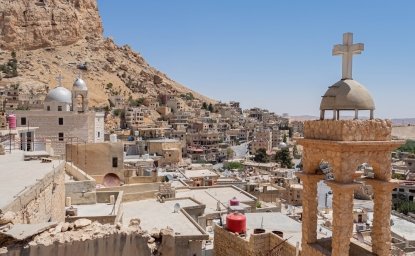On April 11, G8 foreign ministers condemned attacks on residential areas in Syria and warned that chemical weapons use would “demand a serious international response.” Ministers from the United States, Canada, France, Germany, Italy, Japan, Russia and the United Kingdom also reaffirmed their support for the six Deauville Partnership transition countries ― Egypt, Jordan, Libya, Morocco, Tunisia and Yemen. The partnership, launched in May 2011, supports four areas key to successful political transitions: economic stabilization, job creation, good governance, and economic integration.
The following are excerpts from the London meeting statement, with a link to the full text at the end.
Syria
G8 Foreign Ministers expressed deep concerns about the increasing human tragedy of the conflict in Syria. They were appalled that more than 70,000 people have been killed in the conflict and that there are now more than a million Syrian refugees registered by the UNHCR in neighbouring countries, and more than two million internally displaced persons in Syria. They acknowledged the importance of neighbouring countries’ efforts in hosting refugees, and stressed the need for the international community to help the most affected neighbouring countries. They called on all countries to join with them in maximising their contributions to the latest UN appeals and to provide them with direct support in order to help them face this challenging situation.
Against this desperate background, the Ministers reaffirmed their commitment to supporting a Syrian-led political transition, and the work of Joint UN and Arab League Special Representative Brahimi, based on the principles set out in the Geneva Communiqué. This transition should meet the legitimate aspirations of the Syrian people and enable them to democratically and independently determine their own future. They called for the UN Security Council to remain seized of this matter. The Ministers condemned in the strongest possible terms all human rights violations and abuses in Syria and called on all sides to respect international humanitarian and human rights law, noting the particular responsibility of the Syrian authorities in this regard. They welcomed efforts to document all crimes for the purposes of future accountability.
The Ministers condemned the ongoing use of heavy weapons against residential areas and reaffirm their view that any use of chemical weapons would demand a serious international response. To this end, the Ministers reaffirmed the importance of safeguarding sites where any such weapons are held.
The humanitarian situation in Syria is deplorable and continues to worsen. The Ministers called for greater humanitarian assistance and for improved and safe access to the Syrian people by humanitarian agencies in co-ordination with all parties to the conflict.
Middle East Peace Process (MEPP)
G8 Foreign Ministers confirmed their commitment to a just, lasting, and comprehensive peace in the Middle East. They agreed on the urgent need to make progress on the Middle East Peace Process towards this goal and underscored the need for a major international effort, involving all relevant parties, including the Quartet, to drive the peace process forward.
The Ministers welcomed President Obama’s visit to the region and his statement that peace between Israelis and Palestinians is necessary, just and possible. They urged both sides to show the bold political leadership needed to achieve peace, to take the necessary steps to build trust and to work towards the resumption of negotiations without preconditions.
The Ministers stressed that a long term solution to this conflict can be achieved only through direct negotiations, taking note of the 23 September 2011 statement of the Middle East Quartet. Ministers called on parties to refrain from unilateral actions and to create an atmosphere conducive to peace. They strongly reaffirmed that unilateral actions by either party cannot prejudge the outcome of negotiations.
Ministers expressed grave concerns about the poor state of the Palestinian economy, and the impact this has on Palestinian state-building efforts. Ministers affirmed their support for the Palestinian Authority and encouraged Arab countries, as well as emerging economies, to extend the fullest assistance possible to revitalising the Palestinian economy.
The Ministers welcomed the Egyptian-brokered ceasefire of 21 November 2012 which ended hostilities in Gaza and southern Israel, condemned rocket attacks in contravention of this and urged all sides to uphold their commitments.
Deauville Partnership with Arab Countries in Transition
The Deauville Partnership with Arab Countries in Transition has played an important role in bringing together Middle Eastern and North African countries in transition, regional partner countries, G8 members, and International Financial Institutions in an effective and pragmatic partnership to promote successful economic and political transition.
G8 Foreign Ministers reaffirmed their commitment to the six Deauville Partnership transition countries (Egypt, Tunisia, Morocco, Jordan, Libya and Yemen) recognising progress made since the start of the Arab Spring and noting the enduring partnership of the G8 in continuing to address the difficulties they continue to face. Deauville transition countries are encouraged to seek the broadest possible consensus on the political transition in their countries. Ministers reiterated their belief that democratic process, open societies and open economies were essential to create confidence, consolidate political reform and achieve inclusive economic growth. Ministers recalled the principles which are fundamental to the long term security and prosperity of the Middle East and North Africa, and underline our capacity to partner together toward shared goals. Those principles include the responsibilities to reject violence and protect all persons living within their territory regardless of faith, ethnicity, or gender; to promote tolerance and freedom of expression; freedom of religion and belief, including practicing the freedom of religion in safety; and to uphold the rule of law and security.
Ministers welcomed the continued focus of the Deauville Partnership in 2013 on open economies and inclusive economic growth, supporting job creation and increasing economic opportunities for youth and women, and recognised the important role of the International Financial Institutions in delivering this. Areas of focus will include promoting enhanced trade and investment, facilitating access to capital markets, progress on asset recovery, international exchanges and the fight against corruption. Ministers expressed support for the planned high-level conference in London in September, which will showcase investment opportunities in transition countries, and the steps being taken by governments to improve the investment climate. Supporting the growth of small and medium enterprises (SMEs) in the region will be central to economic development and growth. Implementation of SME Action Plans will take place in parallel with a new initiative to provide mentoring support to SMEs. The G8 will also promote a new focus on encouraging women’s participation in business and the economy. Ministers acknowledged the UK’s co-chairmanship of the Open Government Partnership (OGP), and encouraged efforts to engage Deauville Partnership countries in OGP activities.
Ministers welcomed the operationalisation of the Transition Fund and the initiation of the first tranche of high quality projects which will provide technical assistance to help strengthen public institutions and build capacity to advance country-led reforms. There was recognition of the high level of demand from the transition countries for further support of this kind, and Ministers encouraged partners to increase contributions to ensure the initial capitalisation of $250 million is met. Ministers showed support for the ongoing work of extending the geographical mandate of the European Bank of Reconstruction and Development (EBRD) in order to make available greater investment programmes in the region.
As stated in the last Ministerial meeting on the Deauville Partnership with Arab Countries in Transition (New York, 28th September), G8 members will build on the G8’s accountability efforts and report on progress achieved in the Partnership.
The Ministers welcomed the upcoming meeting on April 19th of Deauville Partnership Finance Ministers and look forward to continued work by their Finance counterparts and the International Financial Institutions to provide macroeconomic frameworks for bilateral and multilateral assistance.
Foreign Ministers underlined the critical role of independent civil society organisations in an inclusive political process that responds to the aspirations of the region’s citizens. Ministers reaffirmed the consensus Tunis Declaration reached at the 2012 Forum for the Future, which brings together governments, civil society and private sector leaders to engage in dialogue on social, political and economic reform. They welcomed the UK and Egyptian co-chairing of the process in 2013.
Yemen
G8 Foreign Ministers re-affirmed their strong support for the political transition process in Yemen, including the start of the National Dialogue Conference, as outlined in the Gulf Cooperation Council (GCC) Initiative and the UN Implementation Plan. They encouraged all Yemeni parties to contribute in a positive and meaningful way, and urged all parties to comply with UNSCRs 2014 and 2051. They welcomed the generous pledges made by the Friends of Yemen to underpin the transition and urged donors to deliver rapidly the $7.8bn pledged, which will benefit the lives of ordinary Yemenis.
Ministers recognised the stability of Yemen remains essential for the stability of the wider region, and the maintenance of international security. Ministers commended the Yemeni Government’s steps to advance security sector reform and ongoing efforts to counter the continued threat from AQ-AP and other violent extremists.
Click here for the full text.




